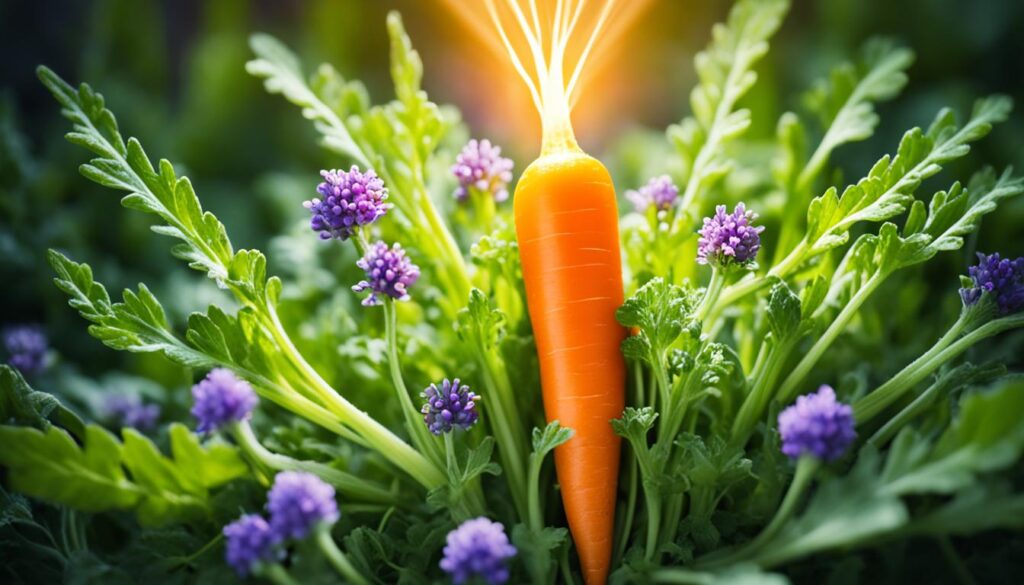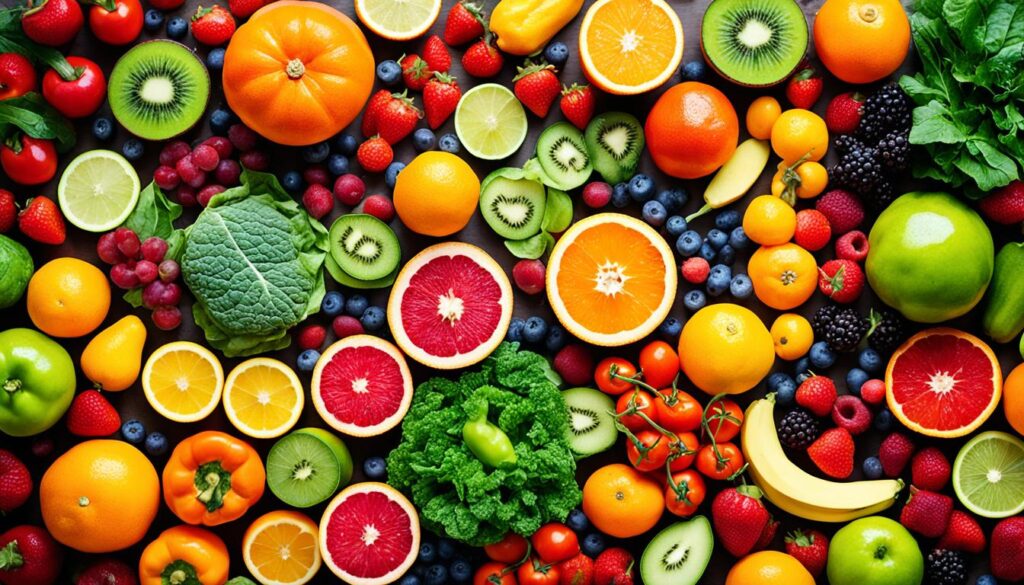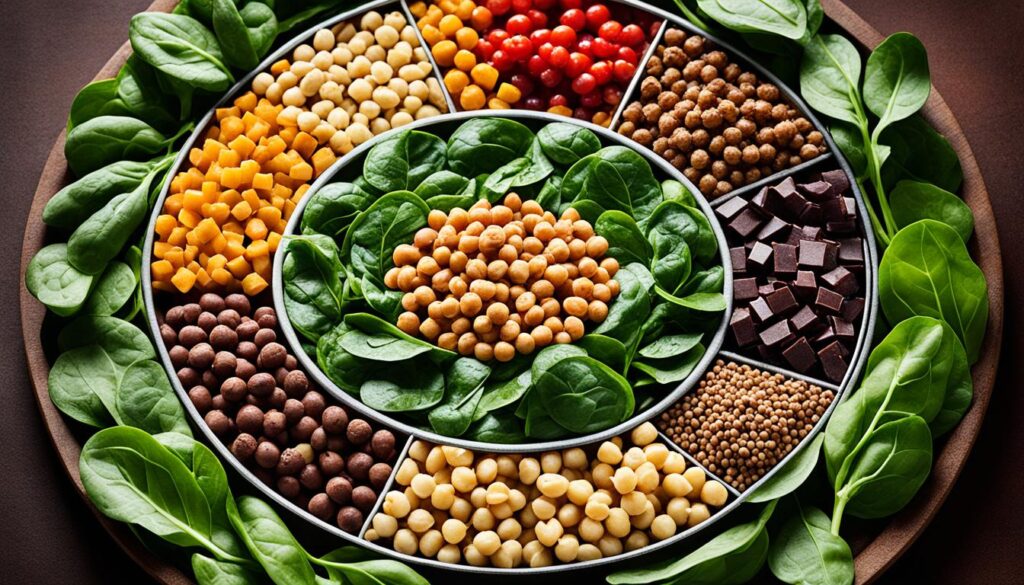Choosing the right vitamins is key to staying healthy. Dr. Xavier Ortiz Ramirez suggests we focus on Omega 3 fish oil, Vitamin D, and Magnesium. These three are amazing for our health. They help keep us strong and ready for life’s challenges.
Key Takeaways:
- Omega 3 fish oil helps our brains work better and fights swelling. This leads to a healthy body and mind.
- Vitamin D is essential for strong bones and a powerful immune system. It’s crucial for staying well and full of energy.
- Magnesium helps control a lot of our body’s activities. It keeps our muscles and nerves in good shape. And, it helps lower stress and worry.
- Always talk to a doctor before adding new vitamins to your daily plan. They can make sure it’s safe and right for you.
The Benefits of Omega 3 Fish Oil
Omega 3 fish oil is a polyunsaturated fat. You can find it in fatty fish. It helps with brain function, fights inflammation, and benefits the heart and joints.
Improved Brain Function
Omega 3s are crucial for your brain’s health. They include DHA and EPA, vital for brain cells. Studies show they improve thinking, memory, and mood.
Reduced Inflammation
Inflammation fights infection but can cause harm. Omega 3s help by reducing bad inflammation. This may ease arthritis symptoms and keep your joints healthy.
Lower Risk of Heart Disease
Heart disease is a major global killer. Omega 3s lower the risk by improving your blood. They cut down on harmful fats, lower blood pressure, and prevent blood clots.
Alleviation of Arthritis Symptoms
Arthritis causes pain and swelling in joints. Omega 3 fights the inflammation, making movement easier and life better.
Omega 3 fish oil offers many health benefits, like better brain function and easing arthritis.
To get enough omega 3s, aim for 250-500mg daily. Eat fish like salmon, mackerel, or sardines. Or, you can take supplements if you’re not a big fish eater.
| Benefit | Omega 3 Fish Oil | Brain Function | Inflammation | Heart Disease | Arthritis |
|---|---|---|---|---|---|
| Key Effect | Essential for brain function | Reduces inflammation | Lowers risk of heart disease | Alleviates arthritis symptoms | |
| Recommended Dosage | 250-500mg per day | – | – | – | – |
| Food Sources | Fatty fish (salmon, mackerel) | – | – | – | – |
| Supplement Option | Omega 3 fish oil capsules | – | – | – | – |
The Importance of Vitamin D for Bone Health
Vitamin D, also known as the “sunshine vitamin,” is important for keeping our bones strong. It helps the body take in more calcium, which is great for bones. This can lower the chance of getting osteoporosis or breaking a bone.
Without enough Vitamin D, the body can’t grab onto all the calcium we eat. Vitamin D steps up to make sure the calcium we eat goes to the bones. It helps the bones get what they need. This keeps our skeleton in top shape.
Vitamin D does even more than help your bones. It boosts our immune system, keeping us from getting sick. A good amount of Vitamin D in our bodies means we’re better at fighting off germs.
Many people don’t get enough Vitamin D. This often happens in places with little sunlight or for those who stay inside a lot. Your age, the color of your skin, and where you live can also play a part. If the sun isn’t much of an option, taking Vitamin D through food or supplements is smart.
The Recommended Daily Dosage of Vitamin D
How much Vitamin D you need each day changes based on who you are and your life. For adults, getting 600-800 IU a day is good. But, always check with a doctor to see what’s best for you.
The Role of Magnesium in the Body
Magnesium is very important for our health. It is key in more than 300 body processes. These include muscle and nerve function.
This mineral helps muscles relax. For athletes and those who work out a lot, this is crucial. It aids in muscle recovery and avoids cramps.
Magnesium also helps us sleep well. It affects our body’s sleep patterns. Good magnesium levels mean better sleep and feeling rested.
It even helps with stress. Magnesium relaxes us, helping to lower stress and anxiety levels. It promotes a calm feeling.
Plus, it’s vital for strong bones. Together with calcium and vitamin D, it builds bones. This mix keeps bones healthy and avoids osteoporosis.
Many don’t eat enough magnesium. Reasons include too much processed food, stress, and some medicines. Not having enough magnesium can cause muscle cramps, tiredness, and being easily annoyed.
The right amount of magnesium changes by age, gender, and health. Men need 400-420mg daily. Women need 310-320mg. Always talk to a doctor about your magnesium needs.
In conclusion, magnesium is essential for our body. It’s crucial for muscles, sleep, coping with stress, and bone health. Make sure you get enough magnesium for a healthier life.
Vitamin A and its Benefits
Vitamin A, or retinol, is important for your health. It boosts your immune system, fights off infections, and keeps you healthy. It’s also key for good eyesight, a strong heart, and healthy bones and teeth.
It’s a top fighter against infections, mainly in the skin and mucous membranes. These protect you from harmful stuff out there. This vitamin makes your immune system stronger, lowering infection risks, and helping you recover quicker.
In terms of eyesight, vitamin A is critical. It helps make rhodopsin, a pigment that lets you see in dim light. This keeps your eyes working well, preventing night blindness and keeping your vision sharp.
Vitamin A is also good for your heart. It helps your heart work well and lowers the chances of heart problems. This vitamin keeps your blood pressure normal, your cholesterol in check, and your blood vessels strong. Eating foods high in vitamin A supports a healthy heart.
Don’t forget how vitamin A boosts bone strength. It helps your bones stay dense and strong. This is key in avoiding bone problems like osteoporosis.
Getting enough vitamin A means enjoying the right foods. Think about eating beef liver, salmon, carrots, and greens. Fortified dairy and cereals are also great options for more vitamin A.

The Importance of B Vitamins
B vitamins are essential for our health. Our body needs them for energy and to grow. They help turn the food we eat into fuel for our body.
They also help our cells and tissues stay healthy. B vitamins are key for making red blood cells. These cells carry oxygen to all parts of our body.
You can get B vitamins from many foods. Fish, eggs, and nuts are great sources. Eating these foods makes sure you get enough B vitamins in your diet.
The Role of Vitamin C in Immune Boosting
Vitamin C is key for a strong immune system and helps heal wounds. It acts as an antioxidant, protecting cells. It also helps make collagen. You can find it in citrus fruits, peppers, strawberries, and broccoli.
This vitamin is crucial for our immune system. It boosts the work of immune cells like phagocytes and T cells. This helps fight off illnesses. Vitamin C can make the common cold less severe and shorter.
Vitamin C also aids in healing wounds. It helps our body produce collagen. Collagen is necessary for wound healing since it forms skin and helps cuts heal.
“Vitamin C is a powerful antioxidant that helps neutralize harmful free radicals in the body, protecting cells from oxidative damage,” says Dr. Sarah Reynolds, a renowned nutritionist.
Eating foods rich in vitamin C is a good way to get enough of it. Oranges, lemons, grapefruits, and peppers are high in vitamin C. Berries, like strawberries and raspberries, are also great sources.
Benefits of Vitamin C:
- Boosts immune system
- Aids in wound healing
- Protects against oxidative damage
- Promotes collagen synthesis
Remember, vitamin C is water-soluble, so your body doesn’t keep it. Adults need 75-90mg daily. But, in stress or sickness, more could be helpful. Talk to a healthcare pro to figure out your needs.
| Food Source | Vitamin C Content (per 100g) |
|---|---|
| Oranges | 53.2mg |
| Red Bell Peppers | 127.7mg |
| Strawberries | 58.8mg |
| Broccoli | 89.2mg |
Add more vitamin C to your meals for a healthy immune system. Enjoy orange juice, salads with peppers, or strawberries. These foods are easy to add to your daily diet.

The Importance of Vitamin E as an Antioxidant
Vitamin E is a key nutrient acting as a strong antioxidant. It protects our cells from damage by free radicals. It supports our immune system, heart health, and lowers heart disease risk.
Vitamin E, as an antioxidant, fights off free radicals. These are harmful and damage our cells. It helps keep our immune system strong.
Vitamin E is vital for a healthy heart. It stops the “bad” cholesterol from becoming dangerous when it touches air. By doing so, it helps keep our heart strong and lessens heart issues.
To get enough Vitamin E, we must eat foods packed with it. Nuts, seeds, spinach, and veggie oils are great sources. Adding these to our meals ensures we get what we need each day.
“Vitamin E is a potent antioxidant that plays a vital role in maintaining our overall health and well-being. Its ability to protect our cells and support our immune system and heart health makes it a nutrient worth paying attention to.” – Dr. Sarah Adams, Registered Dietitian
Key Benefits of Vitamin E:
- Antioxidant Protection: Vitamin E acts as an antioxidant, shielding our cells from bad damage.
- Immune System Support: It bolsters our immune system, key for fighting off illnesses.
- Heart Health: By safeguarding “bad” cholesterol from harm, Vitamin E keeps our hearts healthier.
Vitamin E is vital for our health. Adding Vitamin E-rich foods to our diet keeps us healthy and protects our cells.
The Role of Vitamin K in Blood Clotting and Bone Health
Vitamin K is key for both clotting blood and keeping our bones strong. It helps make proteins that stop us from bleeding too much. Also, it plays a part in making bones by helping to use calcium in them.
It’s also good for healing cuts quickly. Vitamin K makes certain proteins that help wounds close up and keep out bad germs.
Finding ways to eat enough vitamin K is crucial. Green veggies like kale, eggs, and certain oils are rich in it. Eating these foods regularly means you’re taking in what your body needs.

Importance of Vitamin K in Blood Clotting
Vitamin K makes sure our blood clots properly, stopping too much bleeding. It turns on special proteins that start the clotting process. Without enough of it, clotting can go wrong, leading to more bleeding risks.
Benefits of Vitamin K for Bone Health
For bones, vitamin K helps make a protein called osteocalcin. This protein helps put calcium into bones, making them strong. With enough vitamin K, you help keep your bones from getting weak and breaking.
The Importance of Calcium for Bone and Muscle Function
Calcium is a key mineral for our bones and muscles. It helps keep our bones strong and our muscles working right. It is essential for the health of our nerves and muscles as well.
For our bones, calcium is vital. It makes our bones tough and helps in their growth and repair. We need more calcium when we are young to build strong bones. But, even as grown-ups and in our later years, calcium is still very important.
Calcium also helps our muscles work. It allows them to move, whether we’re running or even when our heart beats. Our muscles need the right amount of calcium to work as they should.
If we don’t get enough calcium, our muscles can act up. We might have cramps, feel weak, or our muscles could even spasm. So, keep up your calcium intake for strong muscles.
There are many ways to get the calcium you need. Dairy foods like milk and cheese are top sources. If you don’t eat dairy, fortified foods and plant-based milks can also help.
Greens like kale and spinach also have calcium. They’re not just good for calcium, but they’re also full of healthy nutrients. So, eat a mix of these foods to stay healthy.
The Role of Iron for Oxygen Transport and Energy
Iron is crucial for carrying oxygen in our bodies through red blood cells. This process ensures that all tissues and organs get enough oxygen. Hemoglobin, the protein in red blood cells, binds oxygen and takes it from our lungs everywhere else. If we don’t have enough iron, we can’t make enough red blood cells. This leads to a condition known as iron deficiency anemia.
Besides helping with oxygen, iron is key for a strong immune system. It helps our immune cells grow and work properly, which fights off infections. Iron is also needed to make enzymes for our immune system to function well, keeping us healthy.
Iron’s job doesn’t stop there. It plays a big role in making energy too. It’s part of several enzymes that turn our food into the energy our cells need to function. Iron is important for breaking down carbohydrates, fats, and proteins, our main energy sources.
Food Sources of Iron
You can get iron from both animals and plants. Here are some top iron sources:
- Meat: Red meats like beef and lamb are high in iron. Poultry, such as chicken and turkey, are also good choices.
- Beans: Legumes like lentils, chickpeas, and kidney beans are top for iron, especially for those who don’t eat meat.
- Tofu: Made from soy, tofu is a complete protein and a source of iron, fitting well into most diets.
- Lentils: Nutrient-packed lentils are a versatile plant source of iron for dishes like soups and salads.
Remember, iron from plants is better absorbed with foods rich in vitamin C. Good sources of vitamin C are citrus fruits, peppers, and berries.

Getting enough iron is vital for good health. Eating a variety of iron-rich foods, whether from animals or plants, keeps our iron levels healthy. This supports our body in many important ways.
Conclusion
Omega 3 fish oil, Vitamin D, and Magnesium are top vitamins for health. Omega 3 fish oil boosts brain function and cuts inflammation. Vitamin D helps with bone health and your immune system.
Magnesium helps your muscles and nerves work well. It can also lower stress and anxiety. You can get these vitamins from food. But, sometimes supplements are needed to meet your daily needs. Always talk to a doctor before adding new supplements to your routine. They can help you choose the right amount and avoid any bad reactions with other drugs.
Remember, staying healthy means eating well, moving your body, and getting enough sleep. Vitamins are good, but they don’t replace a healthy lifestyle. By using these top vitamins, you can better your health. This helps you lead a happy, active life.
FAQ
What are the best vitamins for overall health?
Omega 3 fish oil, Vitamin D, and Magnesium stand out as top vitamins. They boost your general health.
What are the benefits of Omega 3 fish oil?
Omega 3 fish oil is great for your brain. It cuts down on inflammation. It also lowers the chances of getting heart disease and arthritis.
Why is Vitamin D important for bone health?
Vitamin D makes sure your bones are strong. It helps your body take in calcium. This prevents bone issues like osteoporosis. It also helps your immune system.
What is the role of Magnesium in the body?
Magnesium helps your muscles and nerves work. It makes you sleep better. It eases stress. Plus, it’s key to lots of body reactions.
What are the benefits of Vitamin A?
Vitamin A fights infections and keeps eyes healthy. It’s good for the heart, lungs, and kidneys. It also makes your bones and teeth strong.
Why are B vitamins important?
B vitamins are needed for getting energy from food. They help you grow. They turn food into the energy your cells need. They also help make new cells.
What is the role of Vitamin C?
Vitamin C makes your immune system stronger. It’s crucial for healing wounds. It’s also an antioxidant, protecting your cells. And, it’s key for making collagen.
Why is Vitamin E important as an antioxidant?
Vitamin E fights cell damage as an antioxidant. It helps your immune system. It’s good for your heart. And, it lowers your heart disease risk.
What is the role of Vitamin K?
Vitamin K helps your blood clot so you don’t bleed too much. It keeps your bones strong too. It’s great for fast wound healing.
Why is Calcium important?
Calcium makes your bones and muscles work. It helps your nerves too. It keeps your blood pressure healthy.
What is the importance of Iron?
Iron makes red blood cells. These cells carry oxygen in your body. It’s needed for a strong immune system, energy, and brain health.




















